Top 6 Enterprise File Sharing Solutions You Should Try
Are you looking for the best enterprise file sharing solutions to streamline your workflow? No more worry! We are here to help you. In this blog, we will help you explore the top 6 solutions that will fulfill the diverse needs of modern businesses. Stay tuned!
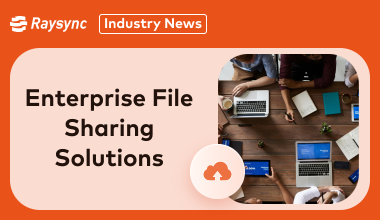
Brief Introduction of Enterprise File Sharing Solution
In times where data can be more precious than gold, data-sharing and security and top concerns for enterprises. Data drives decisions and file transfer solutions have become essential for businesses looking for smooth collaboration with data security.
These solutions not only aid in managing large volumes of data across different verse locations but also enforce compliance and protect sensitive information against unauthorized access.
Full List of 6 Enterprise File Sharing Solutions
From secure cloud-based platforms to on-premises solutions, enterprise file sharing solutions offer a wide range of features designed to address diverse organizational needs.
Whether you prioritize speed, security, compliance, or scalability, we have a list of 6 enterprise secure file transfer solutions that help with optimizing your enterprise's file sharing capabilities.
Let's get started!
1. Raysync [Fastest File Sharing]
Raysync is a leading enterprise file sharing solution known for its unparalleled speed, security, and reliability.
Leveraging innovative UDP-based transfer protocol technology, Raysync ensures lightning-fast file transfers, even across challenging network conditions.
With a focus on accelerating data exchange while maintaining top-notch security, Raysync allows organizations to speed up their workflows and boost productivity.
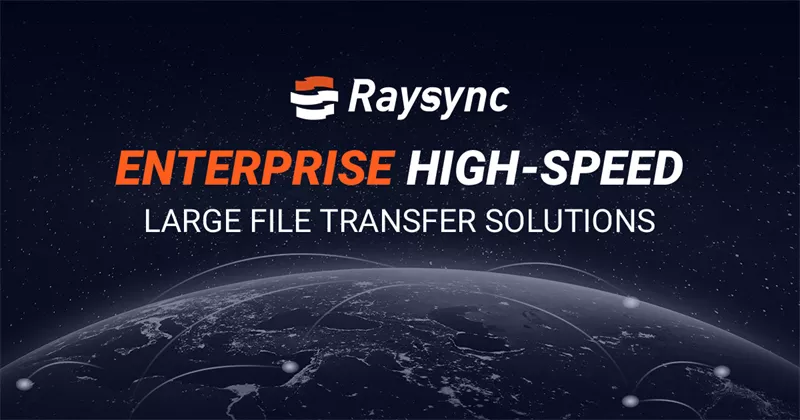
Pros:
- Lightning-fast Transfer Speeds: Raysync offers exceptional speed, allowing rapid transfer of large files and datasets.
- Advanced Security Measures: With AES-256 encryption and comprehensive access controls, Raysync ensures data confidentiality and integrity.
- Scalability: It offers scalability to accommodate growing data volumes and user requirements.
- User-friendly Interface: Raysync's intuitive interface makes it easy for users to initiate and monitor file transfers.
- Cross-platform Compatibility: It is compatible with various operating systems and devices, including Windows, macOS, and Linux.
Cons:
- Limited Collaboration Features: While Raysync excels in file transfer speed and security, it may lack some advanced collaboration features.
- Dependency on Internet Connectivity: As a cloud-based solution, Raysync requires a stable Internet connection for optimal performance.
2. FileCloud
FileCloud is an enterprise file sharing solution that facilitates seamless collaboration and data management.
It offers a versatile platform and empowers organizations to securely share, sync, and access files from anywhere, at any time.
With features like file versioning, selective sync, and robust security controls, FileCloud ensures efficient file sharing while maintaining compliance with industry regulations.
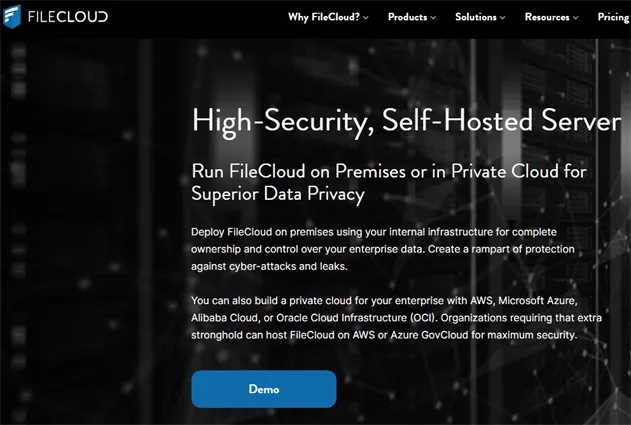
Pros:
- Hybrid Deployment Options: FileCloud offers both on-premises and cloud deployment options, providing flexibility to organizations with varying infrastructure requirements.
- Advanced Collaboration Features: With features like real-time document editing, comments, and annotations, FileCloud enhances team collaboration and productivity.
- Custom Branding and White-labelling: organizations can customize FileCloud's interface with their branding elements, offering a seamless and professional user experience.
Cons:
- Complex Pricing Structure: FileCloud's pricing structure may be a bit complex, with additional costs for some features or user licenses.
- Requirement of Expertise: Administrators may require some time to familiarise themselves with FileCloud's extensive configuration and management options.
- Limited Third-party Integrations: While FileCloud offers integration with popular productivity tools, the range of third-party integrations is limited.
3. Egnyte
Egnyte is an enterprise file sharing solution that offers a hybrid approach to data management, combining the benefits of cloud and on-premises deployment models.
Featuring advanced security features such as encryption at rest and while sharing, Egnyte ensures data integrity and confidentiality.
Its smooth integration with productivity tools and flexible deployment options make it a preferred choice for businesses looking for a versatile file-sharing solution.
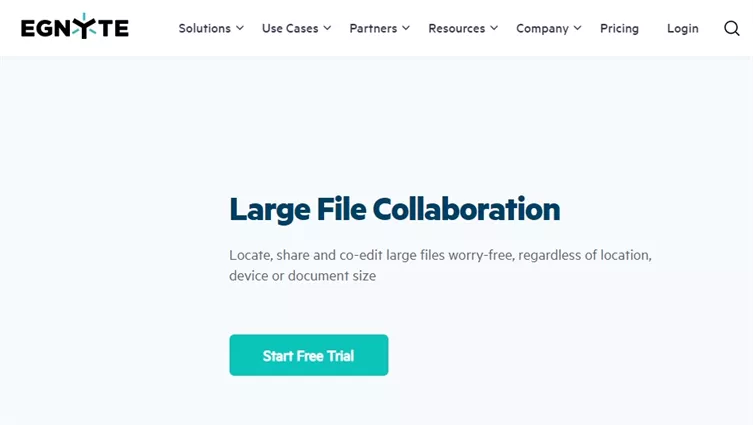
Pros:
- Hybrid Deployment Flexibility: Egnyte offers hybrid deployment options, allowing organizations to leverage both cloud and on-premises infrastructure based on their specific needs.
- Granular Access Controls: With Egnyte, administrators can define detailed access permissions for users and groups, maintaining data security and compliance.
- Solid Version Control: Egnyte's version control features allow users to track changes, revert to previous versions, and collaborate on documents without the risk of data loss or duplication.
Cons:
- Costly Pricing: Egnyte's pricing plans are relatively higher compared to some other enterprise file sharing solutions, especially for organizations with larger user bases or storage needs.
- Complex Setup and Configuration: Setting up Egnyte and configuring advanced features requires a good amount of time and expertise.
- Limited Offline Access: While Egnyte offers offline access to files through its mobile app, the offline functionality is quite limited.
4. TitanFile
TitanFile is one of the trusted enterprise secure file transfer solutions designed for industries with stringent data privacy and compliance requirements, like healthcare and legal sectors.
TitanFile ensures the confidentiality and integrity of sensitive files shared within and outside the organization. Its user-friendly interface and seamless integration with existing workflows make it easy for teams to collaborate securely while adhering to industry regulations.
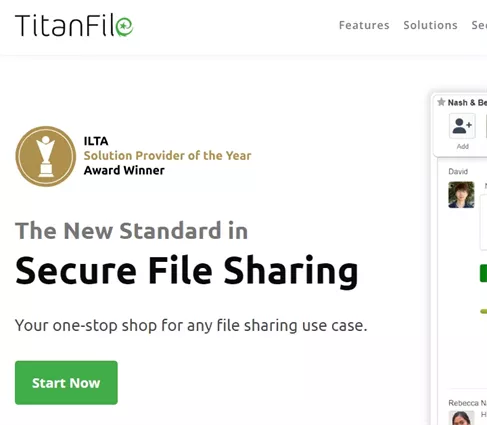
- Pros:
- HIPAA and PIPEDA Compliance: TitanFile is compliant with strict regulations such as HIPAA and PIPEDA, making it ideal for sectors with strict data privacy requirements.
- End-to-end Encryption: All files shared through TitanFile are encrypted from end to end, ensuring data confidentiality and integrity.
- Client Portal Customization: organizations can customize TitanFile's client portal with their branding elements, offering a professional and smooth user experience for clients and collaborators.
Cons:
- Limited Integration Options: TitanFile offers limited integration options with third-party applications.
- Higher Cost: The cost of TitanFile's plans is higher, especially for organizations with larger user bases or storage requirements.
- Learning Requirement for Users: Users may require some time to familiarize themselves with TitanFile's interface and features.
5. Kitework
Kitework is an enterprise file sharing solution curated to meet the various needs of modern organizations. With its intuitive interface and excellent security features, Kitework offers easy collaboration and file sharing while maintaining strict data protection standards.
Kitework's focus on usability and security makes it a preferred choice for businesses that wish to enhance their productivity without compromising on data protection.
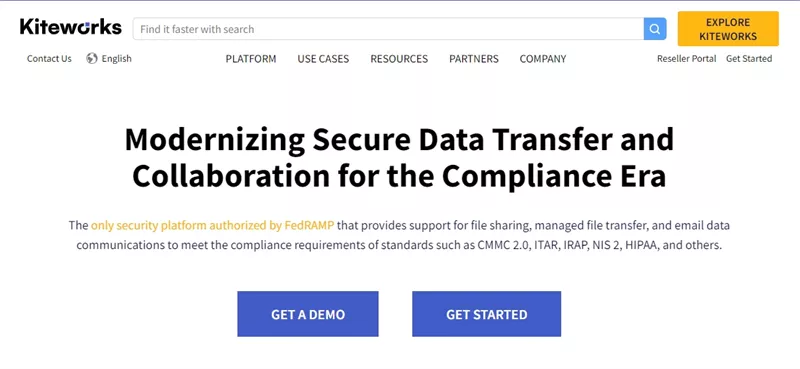
Pros:
- Flexible Deployment: Kitework offers both on-premises and cloud deployment options, offering organizations flexibility in choosing the deployment model that best fits their infrastructure needs.
- Excellent Security Features: With features like encryption at rest and in transit, granular access controls, and comprehensive audit trails, Kitework guarantees data security and compliance.
- User-friendly Interface: Kiteworks intuitive interface and user-friendly design make it easy for users to collaborate and share files.
Cons:
- Costly Pricing: Kitework's pricing plans are a bit expensive compared to some other enterprise file sharing solutions.
- Limited Third-party Integrations: Kitework offers limited integration options with third-party applications, which restricts its interoperability with existing workflows and productivity tools.
- Complex Configuration: Setting up and configuring Kitework, particularly for on-premises deployments, requires technical expertise.
6. Globalscape
Globalscape is an enterprise file sharing solution designed to facilitate secure and efficient data exchange. With a focus on reliability, performance, and compliance, Globalscape enables seamless collaboration while ensuring data integrity.
Globalscape offers scalability and flexibility to adapt to evolving business needs. Its user-friendly interface and intuitive workflows make it easy for users to share files and enhance productivity across the organization.
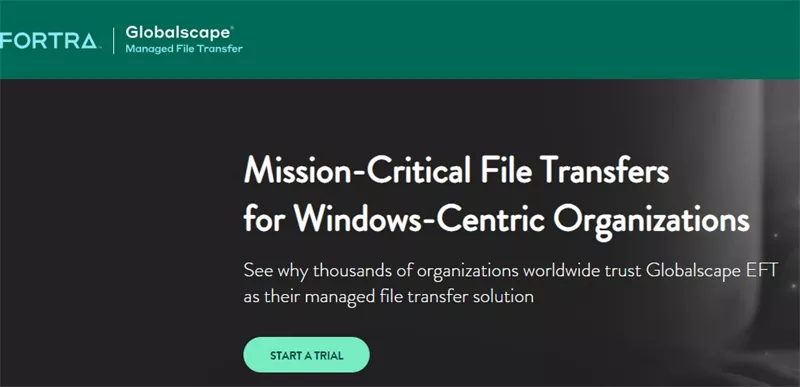
Pros:
- Commendable Security Measures: Globalscape offers advanced security features like encryption, access controls, and audit trails, to protect sensitive data from unauthorized access or disclosure.
- Scalability and Flexibility: Globalscape offers scalability and flexibility to accommodate growing data volumes and user requirements, making it fit for businesses of all sizes.
- User-friendly Interface: Globalscape's intuitive interface makes it easy for users to navigate the platform and perform file sharing tasks efficiently.
Cons:
- Complicated Configuration: Setting up and configuring Globalscape, particularly for on-premises deployments, demands technical expertise and time investment.
- Costly Licensing: Globalscape's licensing fees and subscription costs are relatively high compared to other enterprise file sharing solutions, especially for organizations with limited budgets.
- Limited Integration: Globalscape has limited integration options with third-party applications.
3 Steps to Choose the Most Suitable File Sharing Solution for Enterprise
Choosing the most suitable file sharing solution for an enterprise requires careful consideration of numerous factors to make sure it aligns with the specific needs and goals of your organization.
Here are some tips to help you make the right decision:
1. Assess Your Requirements
- Start by identifying your organization's file sharing requirements, including the volume of data, types of files, number of users, security requirements, and compliance regulations.
2. Consider Deployment Options
- Determine whether you prefer an on-premises, cloud-based, or hybrid deployment model based on your infrastructure, scalability, and data residency requirements.
3. Compare Pricing and Licensing
- Evaluate the total cost of ownership, including licensing fees, subscription costs, implementation, and ongoing maintenance expenses, to determine the solution's affordability and ROI.
With the help of these tips, you can select the most suitable file sharing solution that fulfills your organization's requirements and facilitates secure and efficient collaboration.
For those looking for a high-speed, secure, and reliable file sharing solution, Raysync offers a secure and well-encrypted platform with lightning-fast file-sharing capabilities to boost the efficiency of your enterprise.
The End
We know by now that every enterprise file sharing solution offers unique features along with their pros and cons. And in this long list of choices, choosing the right solutions can make or break the fate of your workflow and collaboration.
You might also like

Industry news
July 25, 2024Top 4 Cloud Based SFTP Tools to Share Large Files
In this blog post we will look at the top cloud-based SFTP tools for efficient large file sharing and discover how these tools enhance speed and security for remote file transfers.
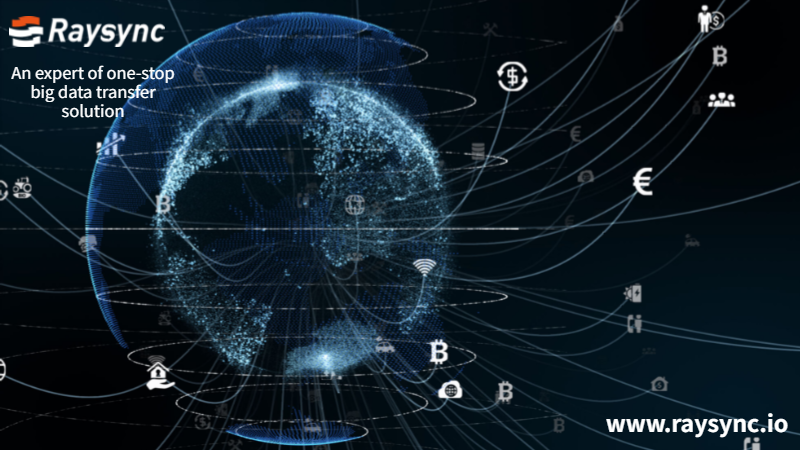
Industry news
July 14, 2020How to Transfer the Large Files of 100GB? It 's Time to Say Goodbye to the Traditional Ways
It's time to say goodbye to the traditional ways. With Raysync, it's never been so easier to transfer large files at such a high speed than ever.

Industry news
June 11, 2020Raysync Transmission: How to Transfer Large Files Efficiently?
The stability of file transfer is fundamentally based on excellent transfer performance. Raysync Transmission is based on UDP transfer performance, breaking through the transfer defects of traditional FTP and HTTP.